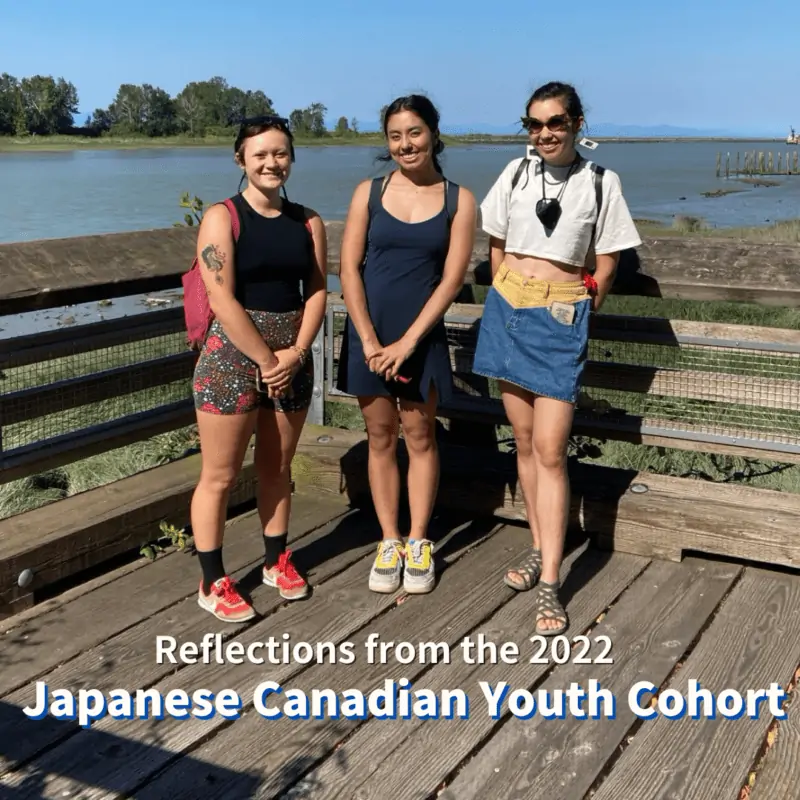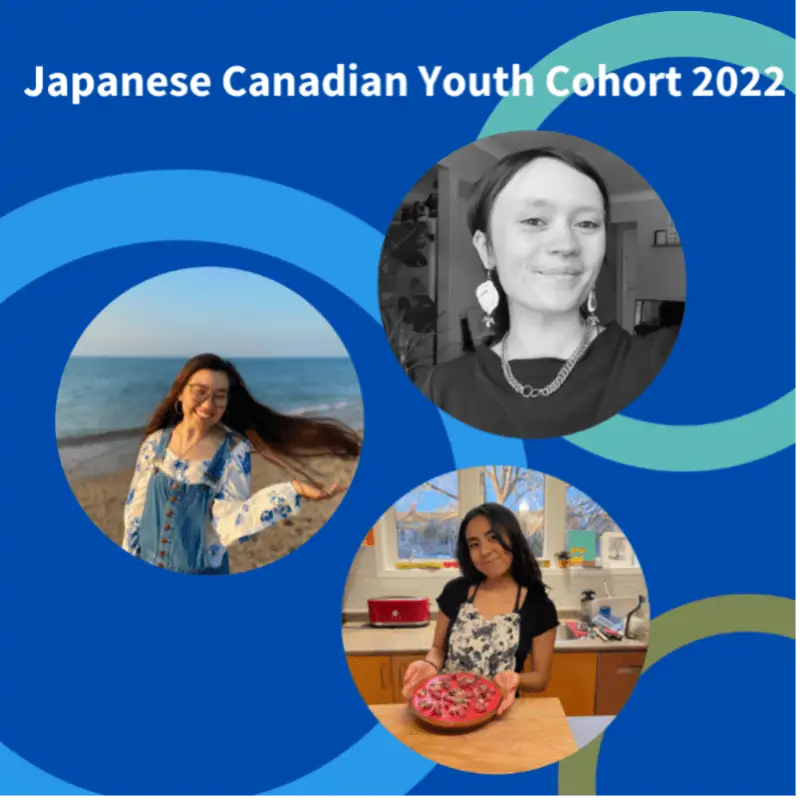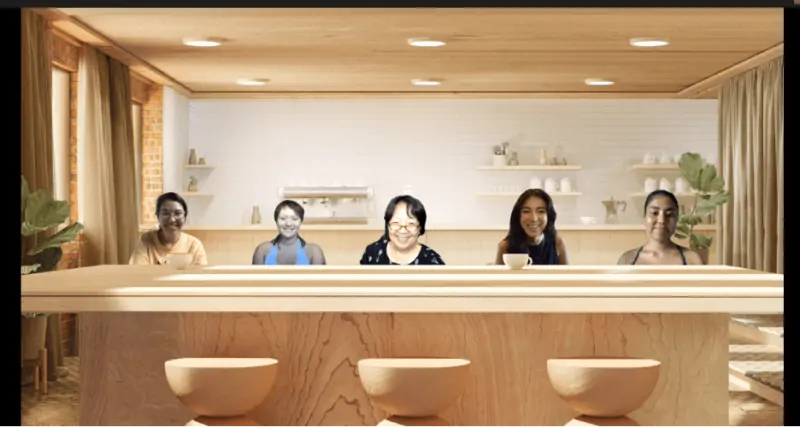Sign Up for our Newsletter
The Powell Street Festival takes place on the traditional, unceded and occupied territories of the Skwxwú7mesh (Squamish), Səl̓ílwətaʔ/Selilwitulh (Tsleil-Waututh), and xʷməθkwəy̓əm (Musqueam) Nations.

This past summer, Powell Street Festival Society welcomed our first-ever Japanese Canadian Youth Cohort to Vancouver. This new program for Japanese Canadian youth ages 19-29 aims to create an embodied experience of Japanese Canadian identity as vibrant and vital. Beginning with online training, education, intergenerational relationship building, and skills development, this program culminated in a 10-day Production Residency in Vancouver, where the Cohort traveled to sites of Japanese Canadian cultural interest and gained hands-on experience as members of the festival production team.

The program brings people of Japanese Canadian identity who were raised outside of British Columbia to connect with their furusato (hometown) in Vancouver. This year, we invited three Yonsei and Gosei youth, Rani Kobayashi from Toronto, Ontario, anaïs peterson from Pittsburgh, Pennsylvania, and Tamiko Chase Kavanagh from Winnipeg, Manitoba.
My inspiration for applying to the 2022 Japanese Canadian Youth Cohort stems from my family’s strong history of involvement in the Japanese Canadian community.
Rani Kobayashi

The first month of weekly online JC Youth Cohort meetings in June centred around the themes of “Getting to Know Each Other & Tools for Communication, Decolonising, and Team Building,” followed by “Getting to Know Community and the Festival” in the first part of July. These sessions honed skills in cross-cultural communication, working across differences, stress identification & management, and asking powerful questions. Guest speakers and community members joined online meetings with the Cohort for intergenerational relationship building, opportunities for Indigenous knowledge sharing, and to introduce creative outlets in Festival-site-specific haiku writing and expressive arts. During the final few weeks of online sessions, cohort members prepared for the Production Residency through practical skills development, including taking part in PSFS’ characteristic Cultural Workers’ Training program alongside members of staff.
The weekly meetings with the Cohort were definitely something I looked forward to […] we were truly getting to know each other.
Tamiko Chase Kavanagh
[The inter-generational mixer] was such a special conversation.
anaïs peterson
The most memorable online JC Youth Cohort experience for me was haiku writing. […] Learning about the various festival locations and finding creative ways to describe them created a mental picture for me that made travelling across the country for the festival less intimidating and foreign.
Rani Kobayashi
After weeks of online sessions and conversation, the Cohort finally came to Vancouver in late July for a 10-day Production Residency built around the 46th Annual Powell Street Festival. During this residency, members of the cohort joined Powell Street Festival staff for in-person Cultural Workers’ Training and joined our volunteer force during the Festival and its pre- and post- production periods.
These experiences were bookended with visits to landmarks of Japanese Canadian community in the Lower Mainland, including field trips to Steveston and the Nikkei National Museum and Cultural Centre in Burnaby. On the trip to Steveston, the Cohort visited the Britannia Historic Shipyards—pictured above—and several outbuildings, the Nikkei Fishermens Memorial, Maples Residence Plaza, the Steveston Nikkei Memorial, Steveston Museum and Japanese Gardens, and other sites of Japanese Canadian legacy in the village. On another trip, intergenerational conversation circles with tea and snacks were held at Nikkei Home and Sakura So seniors’ homes, alongside Radio Taiso exercises, supported by the Japanese Canadian Survivors Health & Wellness Fund. The cohort was also introduced to Paueru Gai and the Downtown Eastside, and the history and role of our communities in this space.
Learning about the historic Japanese fishing town from multiple perspectives was an unforgettable experience. Not only did we get to explore the museum, town, and community centre, but we got the incredible opportunity to be led by two Japanese Canadians who grew up in Steveston pre-war!* That is an experience I will cherish forever.
Rani Kobayashi
*Editor’s note: the program facilitators leading the Steveston trip grew up in the area after WWII, not before.
[On our first day in person] it was so beautiful to really see what it meant for PSFS to be in community with residents of the DTES and the care and relationships that have been built. I think a lot of groups talk about community in a broad sense but to start with that almost grounding and to see those same principles carry through the festival was really wonderful.
anaïs peterson
After enough time passed for decompression, the cohort met online for a final time to reflect on the experience and bring the program to a close.
Thank-you to those who were a part of our first JC Youth Cohort! We hope this post helps paint a picture of the experience and what to expect. When available, the application process for next year’s JC Youth Cohort will be announced on our website and social media.
This article was updated on October 17, 2022, adding an editor’s note clarifying program facilitators’ connection to Steveston, and adding more details on this trip overall.
The Powell Street Festival takes place on the traditional, unceded and occupied territories of the Skwxwú7mesh (Squamish), Səl̓ílwətaʔ/Selilwitulh (Tsleil-Waututh), and xʷməθkwəy̓əm (Musqueam) Nations.